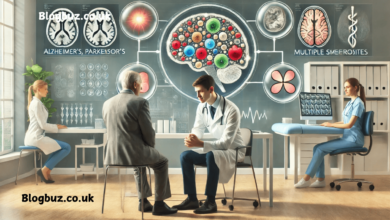Depression in the Digital Age: How Social Media Impacts Mental Health

In today’s hyper-connected world, social media has become an integral part of our daily lives. From scrolling through Instagram feeds to tweeting our thoughts and watching TikTok videos, these platforms have transformed how we communicate, share, and perceive the world. But while social media has its perks, like staying connected with loved ones and accessing information instantly, it also has a darker side. The rise of depression and mental health challenges in the digital age is a growing concern, and social media is often at the center of the conversation.
This article explores the complex relationship between social media and mental health, examining how these platforms can both help and harm. Whether you’re a social media enthusiast or someone who’s curious about its impact, this guide will provide you with a comprehensive understanding of the topic. Let’s explore how the digital age is shaping our mental health and what we can do to protect ourselves.
The Double-Edged Sword of Social Media
Social media is a powerful tool that has revolutionized the way we interact. It allows us to share our lives, connect with people across the globe, and even build communities around shared interests. However, it’s also a space where comparison, negativity, and misinformation thrive. The constant exposure to curated highlight reels of others’ lives can lead to feelings of inadequacy, loneliness, and even depression.
Studies have shown that excessive social media use is linked to higher rates of anxiety, depression, and low self-esteem. The endless scrolling, the pressure to present a perfect life, and the fear of missing out (FOMO) can take a toll on our mental well-being. But why does this happen, and how can we navigate this digital landscape without sacrificing our mental health? Let’s break it down.
The Psychology Behind Social Media and Depression
- The Comparison Trap
Social media platforms are designed to showcase the best moments of people’s lives. Whether it’s a vacation photo, a career milestone, or a picture-perfect relationship, these posts often create an unrealistic standard. When we compare our everyday lives to these idealized versions, it’s easy to feel like we’re falling short. This constant comparison can lead to feelings of inadequacy and self-doubt, which are key contributors to depression. - The Dopamine Effect
Social media is engineered to be addictive. Every like, comment, or share triggers a release of dopamine, the “feel-good” chemical in our brains. Over time, we become reliant on these small bursts of validation, and when they don’t come, we feel a sense of emptiness. This cycle can lead to unhealthy behaviors, such as constantly checking our phones or obsessing over engagement metrics. - Cyberbullying and Online Harassment
The anonymity of the internet can bring out the worst in people. Cyberbullying and online harassment are rampant on social media, and the effects can be devastating. Victims often experience anxiety, depression, and even suicidal thoughts. The constant exposure to negativity and hate can erode self-esteem and make the digital world feel hostile. - The Fear of Missing Out (FOMO)
Social media keeps us plugged into what everyone else is doing, 24/7. This can create a pervasive fear of missing out, where we feel like we’re not living life to the fullest. FOMO can lead to compulsive social media use, as we try to stay updated on every event, trend, or conversation. Over time, this can contribute to stress, anxiety, and depression.
The Positive Side of Social Media
While social media’s negative impacts are well-documented, it’s important to acknowledge its potential for good. When used mindfully, social media can be a powerful mental health support and awareness tool.
- Building Supportive Communities
Social media has created online communities where people can share their struggles and find support. Whether it’s a Facebook group for anxiety sufferers or a hashtag like #MentalHealthAwareness, these platforms provide a space for people to connect and feel less alone. - Raising Awareness and Reducing Stigma
Social media has played a crucial role in normalizing conversations around mental health. Influencers, celebrities, and everyday users are opening up about their experiences with depression, anxiety, and other conditions. This openness helps reduce stigma and encourages others to seek help. - Access to Resources and Information
Social media is a treasure trove of resources, from mental health hotlines to self-care tips. Many organizations and professionals use these platforms to share valuable information, making it easier for people to access the help they need.
How to Protect Your Mental Health in the Digital Age
The key to maintaining a healthy relationship with social media lies in balance and mindfulness. Here are some practical tips to help you navigate the digital world without compromising your mental health:
- Set Boundaries
Establish clear limits on your social media use. Designate specific times of the day for checking your accounts, and avoid scrolling mindlessly before bed. Consider using apps that track your screen time and remind you to take breaks. - Curate Your Feed
Unfollow accounts that make you feel bad about yourself or trigger negative emotions. Instead, follow pages that inspire, educate, and uplift you. Surround yourself with positivity, both online and offline. - Practice Digital Detoxes
Take regular breaks from social media to recharge and reconnect with the real world. Use this time to engage in activities that bring you joy, such as reading, exercising, or spending time with loved ones. - Be Mindful of Your Intentions
Before posting or scrolling, ask yourself why you’re doing it. Are you seeking validation or genuinely interested in connecting with others? Being aware of your intentions can help you use social media more intentionally. - Seek Professional Help
If you’re struggling with depression or anxiety, don’t hesitate to reach out to a mental health professional. Social media can be a helpful tool, but it’s not a substitute for professional care.
The Role of Social Media Platforms
While individuals can take steps to protect their mental health, social media companies also have a responsibility to create safer and healthier platforms. This includes:
- Implementing Stronger Anti-Bullying Measures
Platforms should have robust systems in place to detect and address cyberbullying and harassment. - Promoting Positive Content
Algorithms should prioritize content that promotes well-being and reduces the spread of harmful or misleading information. - Providing Mental Health Resources
Platforms can partner with mental health organizations to offer resources and support to users in need.
Silver Lining Psychiatry: Finding Hope and Healing in the Digital Age
Social media is a powerful force that has reshaped how we live, communicate, and perceive the world. While it has the potential to connect us and raise awareness about important issues, it also poses significant risks to our mental health. By understanding these risks and taking proactive steps to protect ourselves, we can enjoy the benefits of social media without falling victim to its pitfalls. If you or someone you know is struggling with depression, anxiety, or other mental health challenges, remember that help is available. Seeking professional support is a crucial step toward healing and well-being.
Silver Lining Psychiatry stands out as a beacon of hope for those in need of expert care. It is a leading mental health practice with branches in Orlando, Windermere, Winter Park, and Oviedo, FL, dedicated to helping individuals achieve emotional and psychological well-being. With a team of highly skilled psychiatrists, Silver Lining Psychiatry provides comprehensive mental health services tailored to each patient’s unique needs. Their approach combines evidence-based treatments with compassionate care, ensuring every individual feels heard, supported, and empowered on their journey to mental wellness.
Silver Lining Psychiatry focuses on creating a safe and welcoming environment where patients can openly discuss their concerns. Whether you’re dealing with depression, anxiety, bipolar disorder, ADHD, or other mental health conditions, their team is equipped to provide accurate diagnoses, effective treatment plans, and ongoing support. From medication management to psychotherapy, Silver Lining Psychiatry offers a holistic approach to mental health care.
Whether you’re navigating the digital age’s pressures or facing other mental health challenges, Silver Lining Psychiatry has the best psychiatrist windermere fl, to guide you toward a brighter, healthier future. Their other locations extend the same level of care and commitment, ensuring more individuals and families have access to exceptional mental health services.
Let’s use social media as a connection, education, and empowerment tool, not as a source of stress and despair. The digital age is here to stay, but with awareness, compassion, and the right support, we can navigate it in a way that prioritizes our mental health and well-being. If you’re ready to take the first step toward better mental health, consider reaching out to Silver Lining Psychiatry. Their expertise and dedication ensure that you’re not alone in your journey. Together, we can create a digital world that supports and uplifts us, rather than dragging us down.




